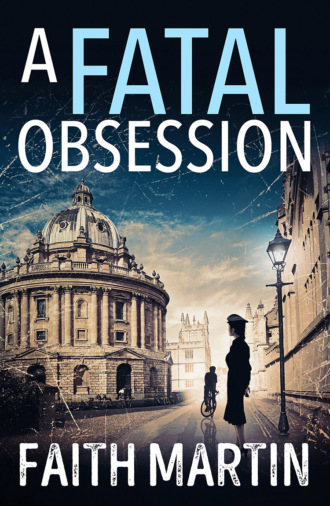
Полная версия
A Fatal Obsession: A gripping mystery perfect for all crime fiction readers
And Trudy, who was wearily hanging up her things in the tiny hallway, couldn’t help but smile. Of course her mother was in the kitchen – Barbara Loveday was rarely anywhere else. Throughout their childhood, she and her older brother, Martin, had spent more time in that tiny, comforting space than anywhere else in the small terraced house in the rather rundown area of Botley they called home.
As a suburb of the city, Botley might lack Headington’s lofty hills and smart new housing, or Osney Mead’s more bohemian and colourful canal-side charm, but Trudy couldn’t imagine living anywhere else. And on a cold, disappointing day, with her bones aching and her eye blackening nicely, she was more than happy to traipse through to the kitchen, where she knew the appetising smell of something tasty cooking, and a warm, loving welcome from her mother could be guaranteed to greet her.
‘You’re home earl—oh, Trudy, love!’ Barbara said helplessly, her face creasing in concern as she saw her daughter’s face. ‘What happened? Come here.’
For a moment, as her mother’s ample form enfolded her and pansy-brown eyes – the mirror image of her own – inspected her face carefully, she didn’t mind feeling as if she was about six years old again. It was, after all, very nice to know that someone loved and cared for you, and here, in this little kitchen, with its cracked linoleum floor and cheerful yellow curtains, she felt safe and appreciated once more.
Which was more than could be said of how she’d felt back at the station.
‘Here, love, sit down. Let me make you a nice cuppa. I’ll put something on that eye. I’ve got some cream that’ll do the trick. I only wish we had a nice bit of beefsteak to put on it.’
Trudy couldn’t help but grin – even though it made her face hurt. Because if the Loveday family had been able to afford a nice bit of beefsteak, she knew full well they’d never be foolish enough to waste it on her face. It would be cooked and scoffed in no time at all.
‘Mum, it’s nothing,’ she insisted, sitting down at the tiny kitchen table, shoved up against one wall to preserve space, and then looking down as Maggie the cat rubbed against her ankles. She reached down absently to stroke her black-and-white fur. But the loud purring that resulted, Trudy suspected cynically, was more likely intended as a spur for someone to feed her than as an offer of support or sympathy for her human companion.
Trudy was wise to the ways of feline cunning.
‘So, what happened this time then?’ Barbara demanded, standing by the sink as she watched the kettle start to boil, hands planted firmly on her ample hips.
Trudy sighed. She really didn’t want to get into this fight again. The same old argument about whether or not women belonged in the police force had been running in the family home ever since she’d told her parents what she wanted to do for a living.
‘Like I said, Mum, it’s nothing. I just slipped and fell on the icy pavement, that’s all.’
Well, that wasn’t totally a lie, Trudy mused. The pavement had been icy. And if she hadn’t so much slipped as launched herself into orbit in order to bring down a bag-snatcher…well, her mother certainly didn’t need to know that.
‘Don’t give me that, Gertrude Mary Loveday,’ her mother warned, making Trudy wince. Only her mother ever called her by her detested full first name – and then only when she was in trouble.
Named after one of her dad’s sisters, who had died young in the war, Trudy had always insisted on the diminutive, practically from the time she had first learned to talk. And teasing from her schoolmates when they’d discovered her proper Christian name had only reinforced her determination to remain strictly – and only – Trudy.
Now she shot her mum a sharp glance.
‘And don’t give me that look, neither,’ Barbara Loveday shot back crisply. ‘You were out chasing villains, weren’t you? That’s how you got that shiner, my girl. Do you think I’m stupid?’
Trudy resisted the urge to slump over the table and hold her head in her hands. ‘Mum, that’s my job,’ she wailed helplessly. ‘That’s what the police do.’
Barbara sniffed. ‘I daresay it is,’ she agreed stiffly. ‘But why are you one of the ones that’s doing it, that’s what I can’t understand. Silly, I call it. I thought when you went to college to learn to do typewriting and shorthand, you’d become a secretary.’ Her mother ploughed on, with the now all-too-familiar lament. ‘You’d have been the first in either my family or your dad’s to do that! Us Butlers and Lovedays have always worked in shops or factories, or on the buses, like your dad. You’d have been the first one to work in a nice office. Even our Martin works with his hands.’
‘He’s a carpenter, Mum,’ Trudy said wryly. ‘He’s earning good money and always will. He’s got a trade.’
‘Yes, that’s true enough,’ Barbara said, taking time off from berating her daughter to beam with pride at the contemplation of her firstborn. ‘I wish he was still living at home, though.’
Trudy smiled. Martin had moved out of the family home over a year ago, to lodge with a friend of the family nearer his work up in Cowley. And, like any other young, fit and good-looking man, very glad he’d been to get out from under his parents’ watchful eyes too. Not that Trudy would ever tell them so! While she had a good idea what the rascal got up to of a Saturday night, she rather thought her mum and dad were still in blissful ignorance.
‘And you could have been a secretary.’ Predictably her mum went straight back on the attack as she heaped three spoonfuls of tea leaves into the kettle and poured boiling water over them. ‘Instead of sitting there now, looking like someone who’s been dragged through a hedge backwards.’
Trudy bit back a groan. No matter how many times she’d tried to explain to her mother that working in a boring office, doing boring, meaningless clerical work, wasn’t for her, Barbara Loveday had never accepted it.
Which was rather ironic really, Trudy thought, fighting back the urge to laugh. For once she’d finished her police training at Eynsham Hall, and been stationed at St Aldates, she’d spent more time typing up reports, filing and making cups of tea for her superiors than any secretary.
It had all been so far removed from what she had thought of as proper police work that she’d despaired of ever being given more responsibility.
So now, just when she’d finally made it onto the beat, and had even managed to get one or two nice little arrests to her name (two shoplifters and a case of minor arson), this disaster with the bag-snatcher had to go and happen! It just wasn’t fair!
She could still see the rather guilty look on Sergeant O’Grady’s face when he’d seen her black eye, and the uncomfortable look on DI Jennings’s face when he’d read her report.
As men, they didn’t like to see women get hurt – especially as a result of violence. And while she understood it (and in a way even appreciated the gallantry of it), she also knew, with a growing sense of frustration, that while they maintained that attitude it was going to be almost impossible for her to advance her career.
Because once she’d finished her two-year probationary period in uniform, walking the beat and doing her general duties, the first chance she got she was going to sit her exams and apply to be a TDC – or Temporary Detective Constable.
It wouldn’t happen at once, of course. Nor would it be a case of working just another two years or so. More likely she’d have to get in a good four or five years before that could happen. But she was determined it would. And no man was going to stop her, superior officers or….
‘Trudy!’
Her head shot up as she realised her mother had been giving her the usual lecture, and she’d been caught out, letting her mind wander.
‘Sorry, Mum,’ she muttered.
Barbara sighed wearily. ‘What’s wrong with settling down with a nice young man and having a couple of young ’uns, that’s what I’d like to know?’ she added stubbornly.
Trudy was about to tell her roundly that there would be plenty of time for all that, but then her mother’s face crumpled. ‘Oh, Trudy, love, it just scares me so, you being out there on your own, walking down dark streets and dressed in that uniform. There are plenty of louts out there who don’t care for the police sticking their noses in their business. What if you get really hurt next time?’
Trudy got up and hugged her mother hard. ‘Please, try not to worry, Mum,’ she said uselessly. ‘They train us how to cope with stuff like that. And besides, I’ve got my truncheon.’
But of course her mother worried – how could she not? And her dad did too. Although more easy-going and tolerant than his wife, and less inclined to lecture her, she was well aware he would have preferred her to find another job. Any other job – even if it was only as a clippie on one of his beloved buses.
She could still remember how he’d laughed when, as a little girl listening to his stories of life as a bus driver for the City of Oxford Motor Services, she’d told him she wanted to drive buses too, when she grew up.
Not that that was an option either, Trudy thought with a brief grin. Who’d ever heard of a woman bus driver?
Still, she knew both her parents agreed anything would be better than their ‘little girl’ working as a serving WPC.
And although she sometimes felt conscience-stricken that she was causing them so much worry and grief, she also knew there was little she could realistically do about it. She’d just have to wait for their anxiety and fears to wear off – which they would have to do eventually, right? And who knew – maybe a little further down the line, when she’d got her sergeant’s stripes and they were feeling as proud as punch of her, they’d look back on days like this and laugh.
CHAPTER THREE
Dr Clement Ryder reached for the claret jug and swore loudly as his hand began to twitch.
It was dark outside, it had been a long and tiring day, and after going out for a quick and rather unsatisfying meal of sausages and mash in his local pub, he felt like he deserved a decent nightcap by his own fireside. Having a nightcap at all was a rare occurrence for him, since he seldom drank alone. Now he realised he probably shouldn’t have bothered, since he couldn’t seem to hold the glass straight, damn it.
At least, he thought grimly, the shakes hadn’t started until after he’d left the office. And so far, praise be, he’d never had an attack of them while actually in court. Which meant the humiliating moment when he’d have to come clean about his condition to his staff and superiors could be put off a while longer yet.
Which was just as well. Clement had no intention of telling anyone anything, if he could help it.
At fifty-seven, Clement was beginning to feel the cold more and more, he’d noticed. Luckily, his thick-walled Victorian house overlooking South Parks Road was relatively draught-proof, and as he carefully poured out a small measure of his third-best claret, he was pleased to note that he didn’t spill a drop.
He smiled sourly, but knew he should be grateful for even small victories.
So far, the shaking palsy that had begun to stalk him a little over five years ago hadn’t become a major issue in his new life. Even though it had, obviously, put paid to his old one.
Born to middle-class parents in a suburb of Cheltenham, Clement had earned a scholarship to Oxford, where he’d studied medicine. From there he’d gone on to a residency at a major London hospital, culminating, after years of hard graft and more study, in a surgical position at the same hospital.
He’d then gone on to specialise in heart surgery, and by the age of forty had smugly assumed his life would continue in the same vein.
Of course, it hadn’t. His children had grown rapidly and, with a thirst for independence, had left home at the first opportunity. Which, as it turned out, was just as well since Angela, his wife, had died before she could reach her fiftieth birthday.
And, as if that hadn’t been enough of a blow, two years later, while preparing for surgery, he’d noticed a slight tremble in his left hand when he’d been scrubbing up.
Naturally, he’d dismissed it as probably nothing. The surgery had gone well, but two weeks later, he’d felt a slight weakness in his arm when he’d been lifting a half pint of beer at a retirement party for one of his colleagues.
Again, he’d dismissed it – but perhaps not quite so quickly, and with an added sense of unease and foreboding.
Over the next year, he monitored himself closely, noting down every little incident, every little unexplained tremble or weakness of limb. And, of course, he’d done his research.
He found that, way back in the mists of time, ‘paralysis agitans’ had been known to physicians. But it was only in 1817 that James Parkinson had published ‘An Essay in the Shaking Palsy’, which best described the familiar characteristics of people suffering from this condition, detailing the resting tremor, abnormal posture and gait, paralysis and diminished muscle strength, and the way the disease progressed over time.
At first, Clement had not accepted it. There were other possible causes of his symptoms, after all. But one thing became immediately clear – he could not continue operating on people until he knew for sure.
And so he’d taken a few weeks of leave and, under a false name, booked himself into a little clinic he knew of in the south of France, where he’d ordered and overseen a series of tests he’d had run on himself. And when the results came in, he knew they effectively meant the end of his world.
Clement sighed heavily now as he took a large gulp of the claret. He was vaguely aware that, since he’d ceased operating, he had slowly grown used to becoming a social drinker – in a minor way. Fastidious about not touching alcohol for so many years, it made a nice change to be able to indulge now and then.
But, he thought now, with a snort of amusement, if people did begin to detect the odd whiff of alcohol on his breath, getting a reputation for being a bit of a lush could be a positive bonus. It would help explain the odd stumble or two, or a bout of clumsy shaking.
Now how was that for irony? A man who’d always been careful not to imbibe too much being taken for a lush? Still, it was better than being thrown on the scrap heap.
Outside, the hail passed, but he continued to stare into the fire, his mind drifting back over the years.
The loss of so much in such a short space of time might have broken a lesser man. But Clement Ryder had never been the sort of man to let life kick him when he was down. So, after tendering his immediate resignation, he had looked around for something to fill his time.
He’d returned to Oxford, but had no desire to teach. Instead, he’d simply sat down one day and asked himself what he did – and didn’t – want from life.
He certainly didn’t want to leave the world of medicine altogether, but he was wise enough – and knew himself well enough – to know that becoming a GP or consultant at some hospital would soon drive him insane. Surgeons were lofty individuals with very healthy egos, and heart and brain surgeons, especially, were used, quite literally, to holding the balance of life and death in their hands.
As ugly and appalling as it sounded, he knew he couldn’t bear to become something less than he’d once been. He also felt he needed a complete change of direction – the challenge of something new, something that could grab his interest, and which would prevent him from slipping into self-pity or bitterness. In short, he needed another major and rewarding goal to aim for.
So, after some thought and investigation, he’d studied law, and retrained to become a coroner.
And it was the coroner’s court that had now been his home, and his world, for the last few years. There, his sharp mind, medical knowledge, newly acquired legal training and natural, dogged determination to find out the truth had become vital assets.
He prided himself – with some justification – on just how quickly he’d come to grips with his new role. After barely a year, he was confident he could tell when witnesses were lying or fudging. He had quickly developed a sixth sense for what the police were thinking and wanted from him – and formed his own opinion as to whether or not to give it to them. And while this latter trait might not have endeared him overmuch to the local constabulary, no one had any doubt that, when Dr Clement Ryder was presiding, a case wouldn’t be allowed to get out of hand.
He was both thorough and competent, and didn’t need to be told his name was both feared and respected by those that mattered – he simply took it for granted!
Which was why the thought of their pity, or glee, should his medical condition became known, was anathema to him. And why he was so determined to keep it a secret for as long as humanly possible. Besides, they’d be bound to try and oust him from his office, and he was damned if he was going to restart his life a third time. No, they’d have to drag him from the coroner’s court by the scruff of his neck, kicking and screaming.
And it would take someone with far more guts than any of his clerks, or those namby-pambies at the Town Hall to do that!
With a grunt of amusement, Clement drank the last of his claret. He had court tomorrow and would be glad of a good night’s sleep. He’d be damned if he’d let his illness affect his professionalism.
He got slowly to his feet – and at six-feet-one he had some way to rise from the chair. In the window he caught a glimpse of his reflection as he passed – his hair now fully silver/white, without even a hint of the dark brown it had once been. Rather watery grey eyes matched the rainwater running down the glass.
With some satisfaction, he noticed that his hand had stopped trembling. For now, anyway. With a sense of relief, he gave a mild, self-satisfied grunt.
Just as he suspected, there were still many good years left in him yet. Which was just as well. Only last year he’d had to steer a jury which had obviously been intent on bringing in an accidental verdict towards an open verdict instead, leaving the way clear for the police to pursue the case further and eventually arrest the guilty party for negligent manslaughter.
As a surgeon who had once had the power of life and death over people, Clement Ryder had no qualms about sitting in judgement over witnesses he knew to be guilty. And making sure they got their just deserts. On his watch, nobody got away with anything!
Naturally, such an attitude hadn’t earned him many friends, but then Clement had never been a man who’d needed the approbation of others. Which was probably just as well, since his friends – real, true friends – were few.
The grandfather clock in the small hallway struck eleven as he tramped past it on his way to the stairs. Tomorrow the inquest on a schoolgirl who’d died after being struck by a car in St Giles would open.
Her grieving family would all be in attendance. It was going to be grim.
Конец ознакомительного фрагмента.
Текст предоставлен ООО «ЛитРес».
Прочитайте эту книгу целиком, купив полную легальную версию на ЛитРес.
Безопасно оплатить книгу можно банковской картой Visa, MasterCard, Maestro, со счета мобильного телефона, с платежного терминала, в салоне МТС или Связной, через PayPal, WebMoney, Яндекс.Деньги, QIWI Кошелек, бонусными картами или другим удобным Вам способом.





